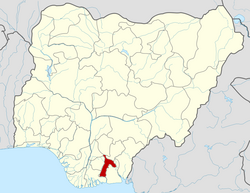This article needs additional citations for verification .(May 2020) |
Aba North | |
|---|---|
| Coordinates: 5°20′N7°19′E / 5.333°N 7.317°E | |
| Country | |
| State | Abia State |
| Headquarters at: | Eziama Urata |
| Government | |
| • Local Government Chairman | Chief Victor Ubani |
| • Local Government Deputy Chairman | Mrs. Joy Iwuchukwu |
| Area | |
• Total | 23 km2 (9 sq mi) |
| Population (2006 census) | |
• Total | 106,844 [1] |
| 3-digit postal code prefix | 450 |
| ISO 3166 code | NG.AB.AN |
 | |
Aba North is a Local Government Area in Aba, Abia State, Nigeria. [2] In the year (1991) Aba North local government was created. [3] The headquarters is at Eziama Uratta. [4] It is amongst the local governments that make up Abia South senatorial zone. [5] Aba North is in the South East geopolitical zone of Nigeria. The Igbo ethnic group is predominant in the area. [5] The people of the area are mostly Christians and traditional worshippers with Igbo and English as the commonly spoken languages. [6] Aba North, an integral part of Ngwaland, consists of indigenes and migrants from other parts of the state who reside in Aba for entrepreneurial and other purposes. [7] [8] [5]
Contents
The postal code is 450. [9]

